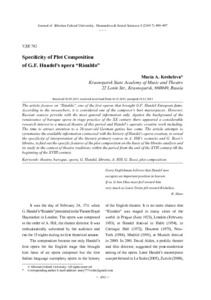Specificity of Plot Composition of G.F. Handel’s opera “Rinaldo”
Скачать файл:
URI (для ссылок/цитирований):
https://elib.sfu-kras.ru/handle/2311/10258Автор:
Kosheleva, Maria А.
Кошелева, М.А.
Дата:
2014-03Аннотация:
The article focuses on “Rinaldo”, one of the first operas that brought G.F. Handel European fame.
According to the researchers, it is considered one of the composer’s best masterpieces. However,
Russian sources provide with the most general information only. Against the background of the
renaissance of baroque opera in stage practice of the XX century there appeared a considerable
research interest to a musical theatre of this period and Handel’s operatic creative work including.
The time to attract attention to a 26-year-old German genius has come. The article attempts to
systematize the available information connected with the history of Handel’s opera creation, to reveal
the specificity of interpretation of the literary primary source in A. Hill’s scenario and G. Rossi’s
libretto, to find out the specific features of the plot composition on the basis of the libretto analysis and
its study in the context of theatre traditions within the period from the end of the XVII century till the
beginning of the XVIII century Статья посвящена одной из первых опер, которая принесла Г.Ф. Генделю европейский успех –
«Ринальдо». По общему мнению исследователей, она считается одним из лучших достижений
композитора. Тем не менее, в русскоязычной литературе об этом сочинении можно
обнаружить информацию лишь самого общего характера. На фоне ренессанса барочной
оперы в сценической практике ХХ века исследовательский интерес к музыкальному театру
этого периода, в том числе и к оперному творчеству Генделя, значительно активизировался.
Пришло время привлечь внимание к шедевру 26-летнего немецкого гения. В рамках данной
статьи предпринята попытка систематизации имеющихся сведений, связанных с историей
создания оперы Генделя; выявления специфики трактовки литературного первоисточника в
сценарии А. Хилла и либретто Дж. Росси; определения особенностей сюжетосложения на
примере анализа либретто и рассмотрения его в контексте театральных традиций конца
XVII – начала XVIII века

